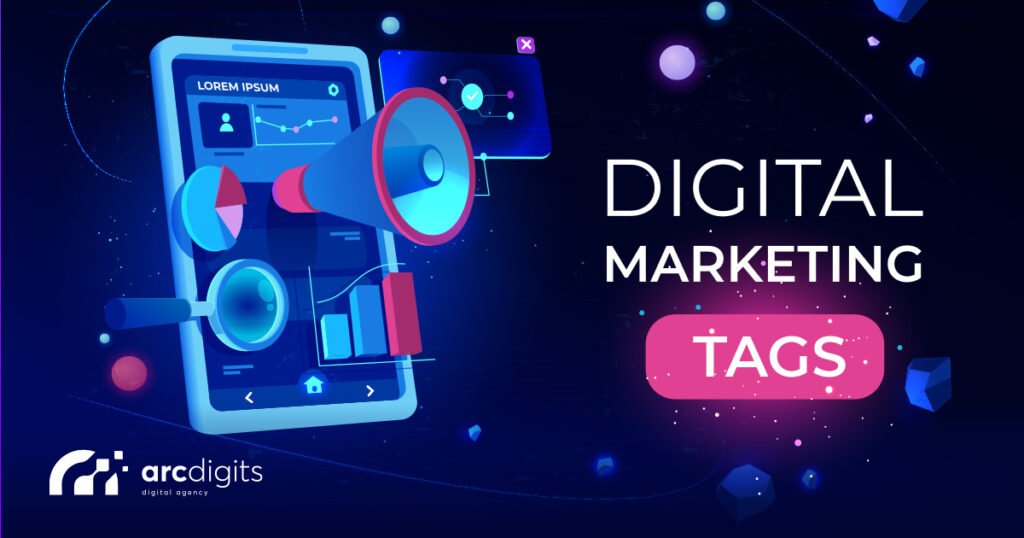In the vast world of digital marketing, understanding the term “tag” is like unlocking a hidden treasure chest of valuable insights. In this article, we’ll break down the concept of tags in digital marketing without diving into the jargon jungle. So, what exactly is a tag, and why does it matter?
Tags in Digital Marketing: The Basics
A tag is like a tiny, behind-the-scenes superhero for websites. It’s a piece of code, a snippet, that’s added to a website to keep track of what’s happening. Think of it as a digital detective – always on the lookout, gathering clues about how visitors interact with a site.
Why Tags Matter
Tags are the unsung heroes of data collection. They help answer questions like:
Who’s Visiting Your Website?
Tags, especially analytics tags, keep tabs on your website visitors. Are they from the bustling streets of New York or the serene landscapes of Tokyo? Understanding your audience is the first step in creating a tailored digital experience.
What Are Visitors Doing?
Conversion tracking tags play a vital role here. They tell you if visitors are signing up for newsletters, making purchases, or just casually strolling through your content. It’s like having a virtual guide through the labyrinth of user behavior.
Are Your Ads Making an Impact?
Ad tracking tags help measure the success of your online advertisements. You get to see which ads are turning heads and which ones are blending into the digital wallpaper.
The Role of Tag Management Systems
Managing tags can be a bit like juggling – without the circus tent. Enter Tag Management Systems (TMS), the master conductors of the tag orchestra. Google Tag Manager is a notable example. It simplifies the tag implementation process, allowing marketers to add, edit, and manage tags without performing a coding acrobatics routine.
The Practical Side: Imagine You Own a Coffee Shop
Let’s step into a fictional scenario. You own a cozy coffee shop named “Bean Bliss.” You decide to take your business online and create a website to showcase your coffee wonders. Here’s how tags come into play:
Analytics Tags:
You add Google Analytics tags to your website. Now, you can see how many people visit your online coffee haven, where they’re coming from, and which coffee blends they’re checking out the most.
Conversion Tracking Tags:
You sprinkle conversion tracking tags on your ‘Order Now’ button. Voila! You can now track how many coffee enthusiasts are turning into loyal customers and placing orders.
Remarketing Tags:
With remarketing tags in place, visitors who explored your coffee selection but didn’t place an order get a gentle nudge. Suddenly, they start seeing ads for Bean Bliss as they browse other corners of the internet.
The List: 3 Key Types of Tags
Let’s simplify further with a quick list of three key types of tags:
Analytics Tags
Keep an eye on your website traffic and user behavior.
Conversion Tracking Tags
Track actions that matter, like purchases or form submissions.
Remarketing Tags
Re-engage with potential customers who’ve shown interest.
FAQs About Tags in Digital Marketing
Q1: Why do I need tags on my website?
A1: Tags help you gather data about your website visitors, understand their behavior, and optimize your online presence for better results.
Q2: What is the role of Tag Management Systems?
A2: Tag Management Systems simplify the process of adding, updating, and managing tags on your website, making it more efficient and less prone to errors.
Q3: Can I use tags for advertising purposes?
A3: Absolutely! Ad tracking tags help measure the performance of your online advertisements, allowing you to refine your marketing strategy.
Q4: Are tags only for large businesses?
A4: No, tags are beneficial for businesses of all sizes. Whether you’re a small coffee shop or a multinational corporation, understanding your online audience is key.
Q5: How do I get started with tags on my website?
A5: Begin by exploring tag management systems like Google Tag Manager. It provides a user-friendly interface to implement and manage tags without diving into complex coding.
Conclusion
In conclusion, tags in digital marketing are your secret weapon to unravel the mysteries of online user behavior. By keeping it simple and utilizing tag management systems, you can harness the power of tags to optimize your digital presence and sip success like a perfectly brewed cup of coffee.


